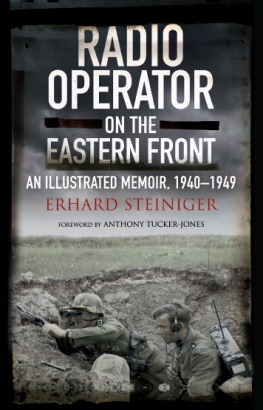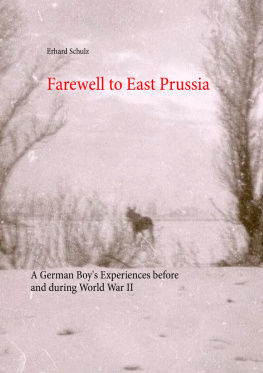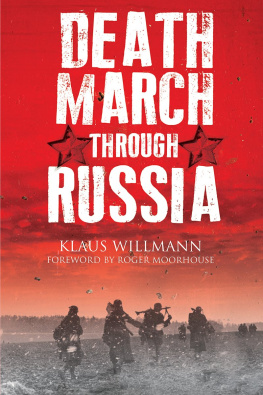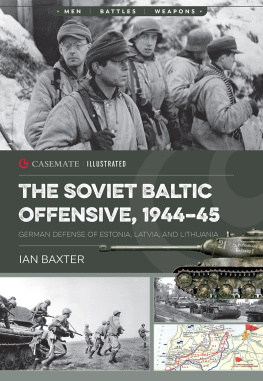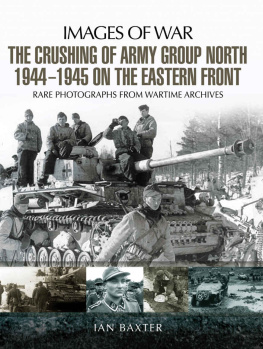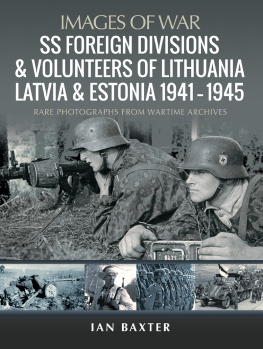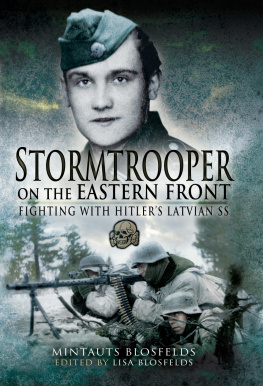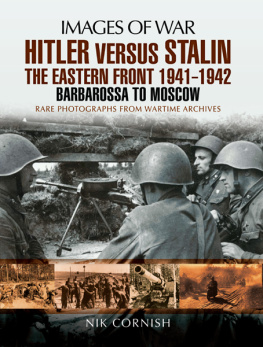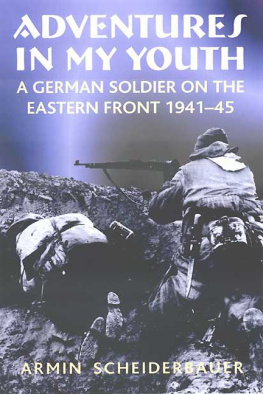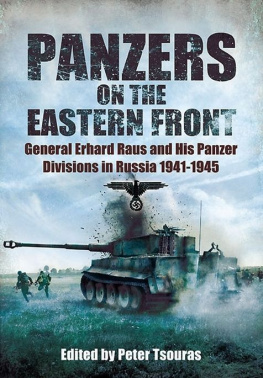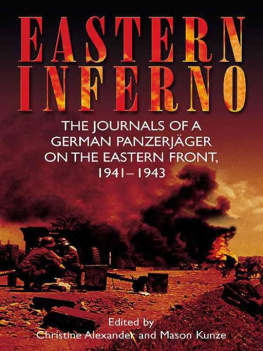Pagebreaks of the print version

RADIO OPERATOR
ON THE
EASTERN FRONT
RADIO OPERATOR ON THE EASTERN FRONT
An Illustrated Memoir, 1940 1949
Erhard Steiniger
Foreword by
Anthony Tucker-Jones
Translated by
Geoffrey Brooks
Radio Operator on the Eastern Front
This English-language edition first published in 2020 by Greenhill Books, c/o Pen & Sword Books Ltd, 47 Church Street, Barnsley, S. Yorkshire, S70 2AS
www.greenhillbooks.com
ISBN : 978-1-78438-618-4
eISBN: 978-1-78438-619-1
Mobi ISBN: 978-1-78438-620-7
Publishing History
First published in Germany in 2019 as Als Funker an den Brennpunkten der Front by Verlagshaus Wrzburg GmbH & Co. KG. Flechsig Verlag, Beethovenstrae 5 B D-97080 Wrzburg
This is the first English-language edition and includes a new foreword by Anthony Tucker-Jones
All rights reserved.
Original text Verlagshaus Wrzburg GmbH & Co, KG, Wrzburg Fleschig Verlag, 2019
Anthony Tucker-Jones foreword Greenhill Books, 2020
Translation by Geoffrey Brooks Greenhill Books, 2020
The right of Erhard Steiniger to be identified as author of this work has been asserted in accordance with Section 77 of the Copyrights Designs and Patents Act 1988.
CIP data records for this title are available from the British Library
Translators Note
Where a persons German rank is mentioned in the original text, I have retained this in the translation for the sake of consistency. The British equivalents of German ranks up to the level of Oberst are as follows:
| Gefreiter | Trained private soldier |
| Obergefreiter | Lance-corporal, but without NCO status |
| Unteroffizier | Corporal (trained NCO) |
| Unterfeldwebel | Lance-Sergeant |
| Feldwebel | Sergeant |
| Oberfeldwebel | Staff Sergeant |
| Stabsfeldwebel | Warrant Officer Class II |
| Hauptfeldwebel | Warrant Officer Class I |
| Leutnant | Second Lieutenant |
| Oberleutnant | Lieutenant |
| Hauptmann | Captain |
| Major | Major |
| Oberstleutnant | Lieutenant-Colonel |
| Oberst | Colonel |
Geographical Names
Similarly I have generally retained German place names to preserve the spirit of the original text, though postwar political changes have made many of these outdated. The list overleaf includes many of these names with their modern equivalents.
| Arensburg | Kuressaare | Mitau | Jelgava |
| Asch | A | Moon | Muhu |
| Beraun | Beroun | Neidenburg | Nidzica |
| Bilin | Blina | Nidden | Nida |
| Birsen | Brzpils | sel | Saaremaa |
| Braunsberg | Braniewo | Pardubitz | Pardubice |
| Bruch | Lom | Pogegen | Paggai |
| Brx | Most | Preschen | Betany |
| Cranz | Zelenogradsk | Reval | Tallinn |
| Dag | Hilumaa | Riesengebirge | Krkonoe |
| Danzig | Gdansk | Rssel | Reszel |
| Dna | Daugava | Schaulen | iauliai |
| Dux | Duchov | Schillen | Zilino |
| Ebenrode | Nesterov | Schweidnitz | widnica |
| Elbing | Elblg | Segewold | Sigulda |
| Ermland | Warmia | Stalinsk | Novekuznetsk |
| Fellin | Viljandi | Striegau | Strzegom |
| Freiburg (Silesia) | wiebodzice | Sworbe | Srve |
| Gotenhafen | Gdynia | Teplitz-Schnau | Teplice-anov |
| Gross-Scharlack | Nakhimovo | Tilsit | Sovetsk |
| Gumbinnen | Gusev | Trakehnen | Yasnaya |
| Heydekrug | ilut | Polyana |
| Insterburg | Chernyakhovsk | Trautenau | Trutnov |
| Komorn | Komrno | Tuckum | Tukums |
| Kniggratz | Hradec Krlov | Wainoden | Vaiode |
| Knigsberg | Kaliningrad | Waldenburg (Silesia) |
| Korschen | Korsze | Wabrzych |
| Labiau | Polessk | Walk | Valga |
| Langugest | Jeniv jezd | Wannow | Vaov |
| Leitomischl | Litomyl | Weckelsdorf | Teplicenad |
| Libau | Liepja | Metuj |
| Litzmannstadt | d | Wesenberg | Rakvere |
| Memel (city/district) | Wolmar | Valmiera |
| Klaipda | Zoppot | Sopot |
| Memel (river) | Neman |
Foreword
I HAVE LONG BEEN A STUDENT of the Second World Wars Eastern Front, a simply vast conflict that is largely neglected in the West. Only in recent years has a growing body of German and Russian memoirs, translated into English, made it much more accessible to a wider audience. Erhard Steinigers wartime biography is the sort of volume that is the lifeblood of a historian, because it shows exactly what it was like to fight at grass-roots level. Steiniger saw action on the northern sector which, apart from the fighting for Leningrad, tends to be overshadowed by the combat to the south, especially the bitter battles for the control of Moscow and Ukraine. It was nonetheless the scene of a series of ferocious and brutal campaigns. In many ways his experiences are similar to those of Guy Sajer, who wrote that classic Eastern Front first-hand account The Forgotten Soldier .
Steiniger served as a signaller, or radio man, with the 151st Infantry Regiment, part of the 61st East Prussian Infantry Division throughout the war. He saw action in Lithuania, Latvia, Estonia, Russia and then Latvia again. Being a signaller hardly seemed a glamorous job, but at least it offered the prospect of regularly being protected within the confines of a headquarters bunker. However, in reality, trudging along with the infantry and burdened down with their radio equipment, signallers presented ideal targets for snipers. Steiniger and his platoon were responsible for keeping highly dispersed companies and battalions in communication, as well as calling down artillery fire and summoning Stuka dive bombers. This was a key job, especially as the war progressed and the battlefield became increasingly confused.
His experiences were no different to the hundreds of thousands of others who fought in Russia, but he was fortunate. He survived to tell his tale, despite the wholesale destruction of his division and his subsequent incarceration in Stalins Gulag for four long years. Steiniger began writing his autobiography for the benefit of his family, very modestly stating I have no great adventures to recount, nor even really unusual experiences He does himself a great disservice in light of what he went through. Notably though, he does not shy away from describing the full horrors of war and the brutally obscene evisceration of soldiers on both sides.

